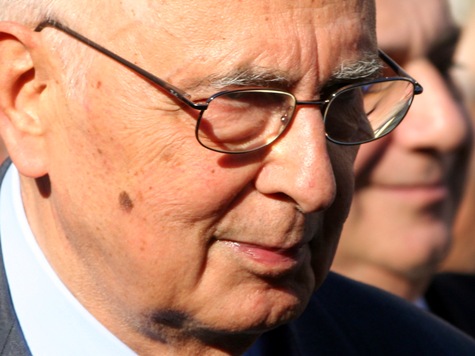The European Union must renew a focus on foreign policy that was neglected as it dealt with a debt crisis, Italy’s president Giorgio Napolitano said in an interview on Saturday.
Napolitano, an 89-year old former Communist hard-liner, told the newspaper La Stampa:
“Over the long years of economic and financial crisis, foreign policy and shared European security have been dramatically sacrificed.” He criticised the EU policy of “containing Russia” and said it was a policy reminiscent of the Cold War.
“The truth is that the international community has not managed to find political or diplomatic solutions to any crisis since Sept. 11, 2001, and has not defused one threat,” he said.
Napolitano gave the interview at the start of Italy’s six months in the rotating presidency of the Council of the European Union.
In what amounted to a demand that the European External Action Service, the EU’s version of a foreign ministry, be given more power over national foreign policy, he said: “These six months cannot only be about internal EU affairs and economic problems, as crucial as they are, but must also be a time for strong European efforts to create a prospect of stability and peace to the east and south of Europe.”
While Italian government policy is led by 39-year old Prime Minister Matteo Renzi, the youngest prime minister in the EU, Napolitano is one of the most politically-engaged of European heads of state in an office which traditionally is only ceremonial.
It is therefore important to understand his attitude towards the EU in order to interpret his remarks: for Napolitano pushes at all times for his own nation to hand over more and more sovereign power to the EU. His interview yesterday appears to be encouragement for the foreign policy of Italy and other EU member states to be taken over by Brussels.
The most illuminating example of Napolitano’s prejudice in favour of the EU over Italian democracy – in economic and political policy as well as foreign policy – can be found in 2011 research by the Wall Street Journal.
A team of WSJ journalists established that Napolitano secretly cooperated with German Chancellor Angela Merkel when she wanted Prime Minister Silvio Berlusconi, who was resisting control of Italian policy by the European Central Bank and other EU institutions, to be pushed from office in 2011, despite Berlusconi having just received a vote of confidence by parliament.
In what amounted to a reconstruction of a German coup in Rome, the Journal reported this on Dec 31, 2011: “Ms. Merkel phoned Mr. Napolitano [on Oct 20] –as Italy’s president, the man with authority to name a new prime minister if the incumbent were to lose parliament’s support.
“Ms. Merkel told the 86-year-old president that Italy’s deficit-cutting efforts were ‘appreciated, but that Europe really wanted to see more aggressive reforms to boost economic growth. She said she was worried Mr. Berlusconi wasn’t strong enough to deliver.
“Mr. Napolitano said it was ‘not reassuring’ that Mr. Berlusconi had recently survived a parliamentary vote of confidence by just one vote. Ms. Merkel thanked the president in advance for doing what is ‘within your powers’ to promote reform.
“Mr. Napolitano got the message. Days later, he quietly began sounding out Italy’s political parties to test the support for a new government if Mr. Berlusconi couldn’t satisfy Europe and the markets.”
From the moment Napolitano sided with Merkel and the European Central Bank against the vote of Italy’s own parliament, Berlusconi’s government was doomed.
With Berlusconi out, Napolitano cooperated in the German-EU plan to have an unelected EU technocrat, Mario Monti, parachuted in as prime minister.
Two years later when voters finally had a chance to give their opinion on Monti, the Merkel-and-Napolitano pick as prime minister, they threw him out. Monti and the party “list” he formed received just 8.3 per cent of the vote. Napolitano remained unabashed.

COMMENTS
Please let us know if you're having issues with commenting.